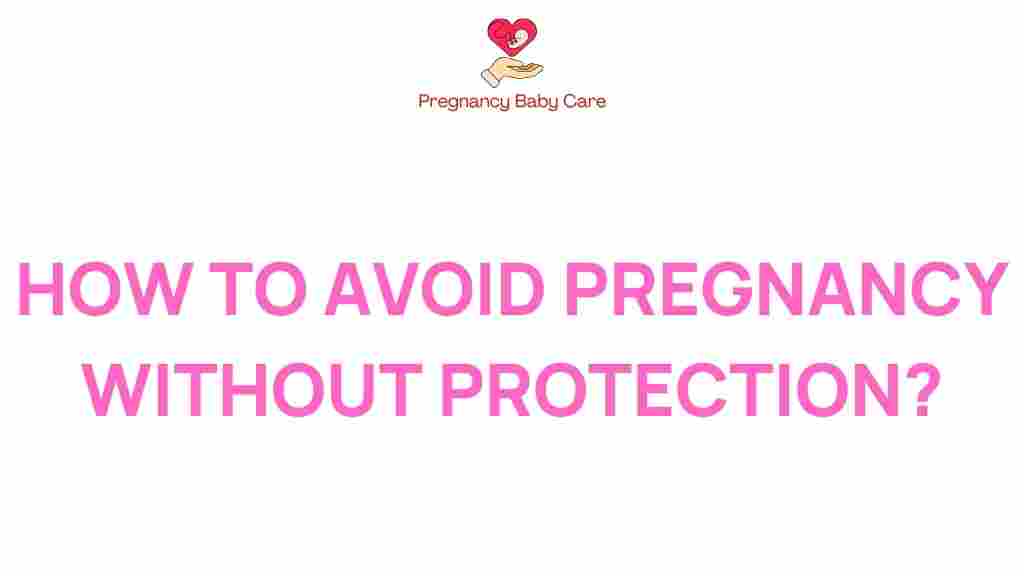Understanding the intricacies of pregnancy and the implications of engaging in unprotected sex is crucial for individuals and couples actively participating in their reproductive health. Whether you’re considering family planning or navigating the challenges of unexpected conception, it’s vital to be informed about your options and responsibilities. This article delves into the complexities surrounding contraception, the importance of safe sex, and various methods of birth control, including natural approaches.
The Basics of Pregnancy and Unprotected Sex
Engaging in unprotected sex can lead to unintended consequences, including pregnancy. Understanding how pregnancy occurs is essential for anyone who is sexually active:
- Ovulation: The release of an egg from the ovaries, typically occurring in the middle of the menstrual cycle.
- Sperm Viability: Sperm can live in the female reproductive tract for up to five days, meaning that unprotected sex can lead to pregnancy even if it occurs several days before ovulation.
- Fertilization: If sperm meets the egg during the ovulation window, fertilization occurs, leading to pregnancy.
Being aware of these factors is critical in managing your reproductive health and making informed decisions about birth control and safe sex.
Importance of Contraception
Contraception plays a pivotal role in enabling individuals to control their reproductive choices. Here’s why it’s essential:
- Prevention of Unintended Pregnancy: Effective use of contraception can significantly reduce the risk of unintended pregnancies.
- Health Considerations: Certain contraceptive methods can also protect against sexually transmitted infections (STIs).
- Empowerment and Autonomy: Understanding and accessing contraception enables individuals to make informed choices about their bodies and futures.
For more detailed information on various contraceptive methods, you can visit this resource.
Exploring Natural Methods of Birth Control
If you prefer not to use hormonal or barrier methods, several natural methods can be effective in preventing pregnancy:
- Fertility Awareness: Monitoring your menstrual cycle and identifying fertile windows can help in planning or avoiding pregnancy.
- Cervical Mucus Monitoring: Changes in cervical mucus can indicate ovulation.
- Temperature Method: Tracking basal body temperature can also help identify ovulation.
These methods require diligence and consistency but can be effective for those looking for natural solutions to family planning.
Safe Sex Practices
Practicing safe sex is crucial for protecting your reproductive health. Here are some strategies:
- Use Condoms: Condoms are the only method of contraception that also protect against STIs.
- Regular STI Testing: Regular testing can help ensure that any potential infections are addressed promptly.
- Open Communication: Discussing sexual history and health with your partner fosters a responsible approach to safe sex.
Step-by-Step Process for Family Planning
Creating a family planning strategy involves several steps:
- Assess Your Goals: Determine whether you want to prevent pregnancy, achieve pregnancy, or space out children.
- Educate Yourself: Research various contraceptive options and natural methods.
- Consult a Healthcare Provider: Speak with a healthcare professional about the best options for your situation.
- Track Your Cycle: If using natural methods, start tracking your menstrual cycle.
- Choose a Method: Select a birth control method that aligns with your health, comfort, and lifestyle.
- Regular Follow-ups: If you’re using hormonal methods, schedule regular check-ups to monitor their effectiveness and address any concerns.
Troubleshooting Common Issues
Even with the best planning, issues can arise. Here are some troubleshooting tips:
- Missed Birth Control Pills: If you miss a pill, follow the instructions provided with your birth control for missed doses.
- Condom Breakage: If a condom breaks during sex, consider emergency contraception and consult a healthcare provider.
- Uncertain Ovulation: If you’re unsure about your ovulation, use ovulation kits or consult a fertility expert.
Staying informed and proactive can help you navigate any challenges associated with your reproductive health.
Conclusion
Navigating the complexities of pregnancy and reproductive health requires education, awareness, and proactive measures. Whether you choose to use contraception, explore natural methods, or engage in safe sex practices, understanding your options empowers you to make informed decisions. Remember, communication with your partner and healthcare provider is essential in ensuring a healthy and responsible approach to family planning. For more information on reproductive health, visit this informative site.
Ultimately, being informed about safe sex, birth control, and fertility awareness will not only help prevent unintended pregnancies but also promote a healthier approach to relationships and family planning.
This article is in the category Pregnancy and created by PregnancyBabyCare Team
